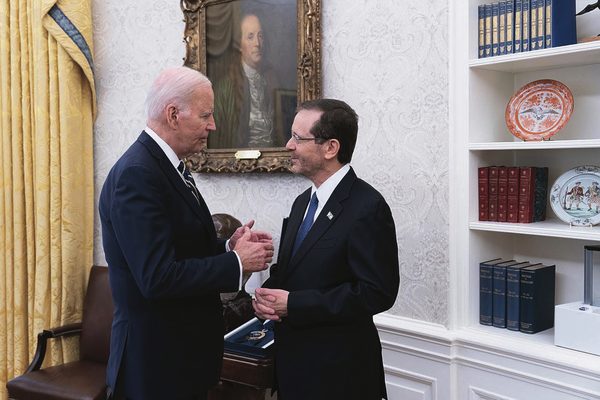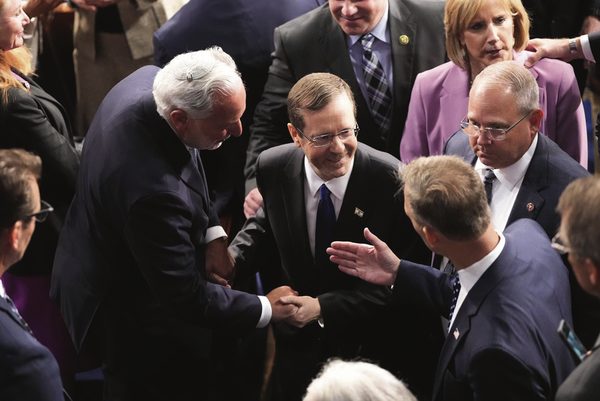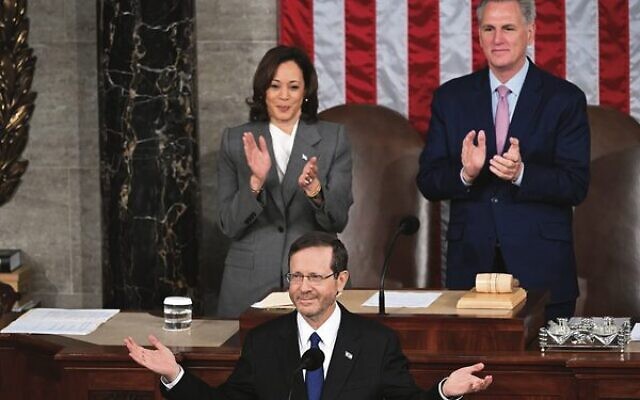A diplomatic mission of mixed outcomes
Israeli President Isaac Herzog flew to the US to heal the Biden–Netanyahu rift. Instead he exposed its depth.
(TIMES OF ISRAEL) – President Isaac Herzog’s task in Washington was as straightforward as it was delicate. With two dangerous fissures emerging – between US leader Joe Biden and Prime Minister Benjamin Netanyahu and between government and opposition supporters back in Israel – Herzog’s visit offered a timely opportunity to craft bridges across the chasms.
Initially, it seemed that Herzog might have succeeded in keeping Washington and Jerusalem from drifting any further apart at the very least.
Hours before Herzog took off from Israel for Washington – an invitation that Netanyahu has waited for since he returned to office – Biden spoke with the Prime Minister by phone, in what seemed to be a clear attempt to reduce the magnitude of the snub. He invited Netanyahu for a meet at long last, though it’s not yet clear if it will take place at the White House.
Biden’s change of tone was even more noticeable in his meeting with Herzog last Tuesday.

After his administration weighed in several times in recent months to warn Netanyahu’s government against advancing the original version of its judicial overhaul and to only adopt reforms that have consensus support, Biden notably made absolutely no mention of the issue during his comments in front of the press.
He did not remind Israel that bilateral ties are rooted in democratic values, his not-so-subtle warning about the potential effects of the judicial reform passing successfully and avoided other potential areas of friction, including settlements, a two-state solution and Netanyahu’s far-right coalition partners.
Instead, Biden told Herzog about his love for Israel, calling it “deep-rooted and long-lasting”.
“This is a friendship which I believe is simply unbreakable, unbreakable and together we are working to bring more integration and stability in the Middle East,” he said.
A message through Friedman

But it didn’t take long before it became painfully obvious how wide the gaps between the governments actually remained and that Herzog’s largely symbolic visit might not suffice to bring them back together.
The White House statement on last Tuesday’s meeting returned to the subtly critical language that the administration has been using since Netanyahu returned to power. It mentioned that Biden noted that the US–Israel relationship is “based on the bedrock of shared democratic values”, with the hint that if the reform passes, the foundations of the relationship will have shaken.
It also said the leaders “discussed the need for a consensus-based approach to the judicial reform package”, something quite different than the emerging situation, in which the coalition is poised to pass changes unilaterally, over the increasingly desperate protests of the opposition.
The statement said that Biden spoke about another area of ongoing disagreement, a Palestinian state.
“President Biden reiterated his commitment to maintaining a path for a negotiated two-state solution to the Israeli–Palestinian conflict, the best avenue to a lasting and just peace, and to providing Israelis and Palestinians equal measures of freedom, prosperity and security,” said the US readout.

Secretary of State Antony Blinken, who repeatedly lectured Israeli leaders on democratic values when he visited Israel in February, returned to the same themes before his meeting with Herzog.
“We have, indeed, a unique relationship grounded in our commitment to Israel’s security, but also grounded in democratic values,” said Blinken.
He also indicated that failing to find a solution with the Palestinians would undermine Israel’s status as a democracy. A two-state solution, he said “is essential to Israel’s long-term security and its standing as a democratic and Jewish state”.
But most concerning for the future of the relationship was the interview Biden gave to New York Times columnist Thomas Friedman hours after his warm meeting with Herzog. That interview – to which Biden dedicated more time than he did Herzog – was meant to make perfectly clear that the US President was in no way assuaged.
Biden, who didn’t warn Herzog he was about to create headlines that would overshadow their friendly meeting, told Friedman that he expressed his concerns on the judicial overhaul to Herzog.
According to Friedman, Biden wanted to express that if the judicial overhaul proposals are passed, “you’d be breaking one of the most important bonds between the United States and Israel, our shared values around democratic decision-making and an independent judiciary”.
To further remove any doubt, the White House reiterated that Friedman’s piece “directly quoted the President” and that Biden’s “comments in the article stand for [themselves]” last Wednesday, the same day Herzog’s addressed Congress.
And on Thursday, National Security Council Spokesman John Kirby went on Israeli news to again underscore that Friedman’s piece is an “accurate reflection” of this conversation with Biden.
The lady doth protest too much
Herzog’s other showcase event on his trip was his address to a joint session of Congress. The speech was, in many ways, classic Herzog. It was a mix of family history, Jewish teachings, biblical references and ultimately, a vision of Israel’s future as a nation that contributes to the welfare of humanity.
He also sought to present Israel not as a junior partner dependent on the US for its survival, but as a full-fledged, co-equal ally facing the same challenges.
“It is clear that America is irreplaceable to Israel,” he said, “and Israel is irreplaceable to America. It is time to design the next stage of our evolving friendship and our growing partnership together.”
But when a world leader has to reiterate repeatedly that his country is a liberal democracy, it gives the impression that there might be reason to doubt that claim.
“Being powerful is like being a lady,” said British prime minister Margaret Thatcher. “If you have to tell people you are, you aren’t.”
The leaders of most Western democracies don’t have to go around lauding their free and fair elections and minority rights. When Israel’s leader does so, even though the bipartisan crowd stood and applauded, it’s a sign there is something amiss.
It’s not clear how much Biden’s message has gotten through to Netanyahu or his partners, but Herzog, who has pushed compromise talks on the overhaul legislation, echoed Biden’s comments on Israel’s domestic strife, noting that Israel’s vibrant democracy is “safeguarded by its strong Supreme Court and independent judiciary”, in what appeared to be clear rebuke of the government’s plan, which would reduce the court’s independence.
The President will have plenty to be proud of on his trip. There isn’t much that brings the parties together in the US and seeing hundreds of lawmakers rise on both sides of the aisle is an important statement abroad the breadth of support for Israel.
“I’ve appeared before many parliaments,” he said last Thursday, “but it extremely emotional to see the enthusiasm that was there.”
His personal friendship with both Biden and Vice-President Kamala Harris was apparent. And he met with members of the Congressional Black Caucus, who represent a community with which Israel has had trouble finding common ground.
“One thing was very clear,” Herzog told reporters in New York last Thursday. “There is love for Israel on both sides of the aisle, despite the impression one gets in Israel that it’s a lost cause.”
But when he flew back to Israel on Saturday night, Herzog was heading back into a political maelstrom growing ever more dangerous as it tears at the ties that unify Israeli society. Justified or not, that battle is keeping the US President and Israel’s Prime Minister from focusing on the Iranian threat and from building on the Abraham Accords.
Ever the dogged optimist, Herzog will put his head down and keep pushing the sides to come to some agreement on judicial reform. And he has stayed upbeat on the future of US–Israel ties. But it may take more than positive cheer and symbolic meetings to change a reality that is growing more problematic with every passing week.
Lazar Berman is The Times of Israel’s diplomatic reporter.


comments